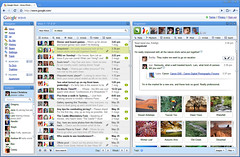Google Wave Crashes Over Microsoft
 With Wave, which Google previewed for developers at its I/O conference yesterday, developers can for the first time create Web-based applications that compete with Microsoft in terms of quality (while utterly trumping it on price). It also creates the conditions for customers to comfortably shuck off the shackles of installed software -- including Office and other Microsoft products -- in exchange for truly lightweight hardware like netbooks or advanced smartphones, without sacrificing the richness of their computing experience. If it gets the kind of developer love it should, Wave is just the first of a series of a breakers that will loosen Microsoft's grip on the desktop, and may also render Adobe wholly irrelevant.
With Wave, which Google previewed for developers at its I/O conference yesterday, developers can for the first time create Web-based applications that compete with Microsoft in terms of quality (while utterly trumping it on price). It also creates the conditions for customers to comfortably shuck off the shackles of installed software -- including Office and other Microsoft products -- in exchange for truly lightweight hardware like netbooks or advanced smartphones, without sacrificing the richness of their computing experience. If it gets the kind of developer love it should, Wave is just the first of a series of a breakers that will loosen Microsoft's grip on the desktop, and may also render Adobe wholly irrelevant.
Wave is a Web-based application that breaks artificial barriers between document types; work documents, email, instant messages, photographs, maps -- Wave makes no functional distinction between them, and allows users to literally drag all those elements into a single, shareable meta-document. Wave is written using HTML 5, the first significant change to standards for Web coding since 1998. HTML 5 also forms the basis for Webkit, the language underlying the operating systems of the vast majority of smartphone browsers -- Apple's iPhone, Research in Motion's BlackBerry, Google's Android, Palm's WebOS and Nokia's Symbian. The one glaring omission? Microsoft Windows Mobile, of course.
Mashable, which offers more functional details about Wave, summarizes it as a real-time communication platform that
combines aspects of email, instant messaging, wikis, web chat, social networking, and project management to build one elegant, in-browser communication client.The significance of the power of HTML 5 and Webkit cannot be overstated, because it allows a richness of experience comparable to what Microsoft can offer with Office and Silverlight. Tim O'Reilly published a graph that illustrates the Web experience overtaking the experience of installed (native) applications as inexorably as a cheetah overtaking an antelope.
The growth of Mozilla's Firefox and the recent, stunning growth of Google's Chrome, both at the expense of Microsoft's Internet Explorer, means that Web developers can write for HTML 5 without worrying about missing a significant portion of the market, and Web developers in the mobile market can write for Webkit, which is supported by 80% of smartphone Web browsers.
Gary Edwards, a Web developer and former president of the OpenDocument Foundation, told me Wave means "the greater web of designers can be designing a new type of document -- one that's multidimensional, highly graphical, highly interactive, and not OS-specific or device specific."
The implication, Edwards told me, is that Wave is the thin edge of the wedge -- or the thin edge of the Web -- that could crack Microsoft's dominance on the desktop. "Once they lose the document model, they might have lost it all," he said.
Wave also threatens to swamp Adobe, whose rich Internet application client, Flex, may be shunted off to irrelevance. Like Microsoft Silverlight, Flex is supposed to allow Web applications to run on the desktop like a native application, but that only matters in an environment where Web-based applications are second-class citizens. Adobe probably figured that it had several years before HTML 5 became ubiquitous, and while it has yet to be formally adopted by standards bodies, HTML 5 is already supported by Firefox, Chrome and Safari.
But like Microsoft, Google's fortunes are ultimately tied to the enthusiasm for and adoption of HTML 5 by developers, which is why it stage-crafted its introduction of Wave to them so carefully. Now, it just needs to sit back and wait for them to create the applications that will allow it to steal more and more users away from Microsoft.
Other than Google itself, Apple is the biggest beneficiary of Wave and the widespread adoption of HTML 5. Apple has already been on the path to creating a compelling Web-based computing experience to compete with Microsoft, but having Eric Schmidt on its board certainly can't have hurt Apple's timing or the technical details of its strategy. The upcoming Apple conference should be something to behold.